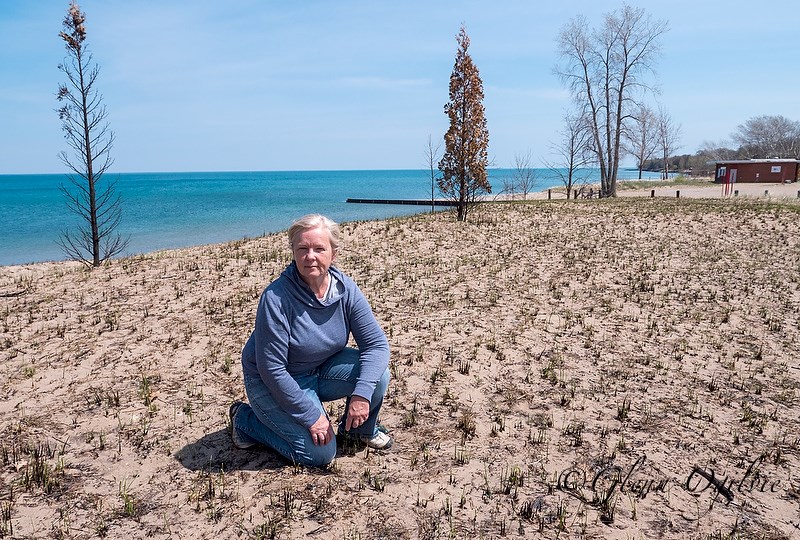Pam Wright
An accidental fire that torched a large swath of dune grass at Canatara Beach could have been much worse, says a local environmentalist.
Kim Gledhill, who has spearheaded numerous plantings of the indigenous grass in the park, said a south wind prevented the blaze from spreading and burning too hot.
“It’s very lucky the fire didn’t jump and burn up all of the grass,” she added.
Sarnia firefighters extinguished the fire west of the beach change rooms in the late afternoon of April 30.
It’s one of several sections on Canatara’s famed stretch of sand where the plant has been reintroduced after being nearly eradicated by human traffic.
Luckily, Gledhill said all is not lost. Mother Nature is doing her thing and green shoots, spread by way of underground rhizomes, are popping up through the blackened patch.
According to data from the Lake Huron Coastal Centre, only 2% of Lake Huron’s natural dune grass habitat remains. That’s a concern, Gledhill said, because the plant serves as an important filter for water, a buffer against wind and water erosion, and a specialized habitat for at-risk species.
“If you take dunes out you just have a cobble beach,” she said, “and that’s not good for wildlife or people.”
Canatara is an important resting spot for species migrating north across Lake Huron.
“We have incredible diversity here considering the number of people we have using this park,” she said, adding the public doesn’t understand the relevance of dune grass and sees it as a pesky weed.
Gledhill, a Corunna resident who owns a cottage in the Kincardine area, said many private landowners there work in tandem with the Lake Huron Coastal Centre to establish dune grass preserves on private lands.
Gledhill said she isn’t aware of any such initiatives in Lambton County, outside of a long ago dune grass planting by Lambton Wildlife at the west end of Canatara.
Patti Ross, Sarnia’s manager of parks, forestry and horticulture, said it’s a good thing the grass is regenerating given how important it is to the health of the beach.
She said the city is stepping up protection, primarily through educational signage.
“We need to keep an eye on it,” Ross said.
Signs explaining the importance of the plant will be going up shortly, and strategically placed security cameras are already in place.
Ross said a barbecue located beside a pathway through the dune will be also be removed.
“The benefits of the dunes far out way the benefits of the barbecue,” she said.
Ross said most of Canatara’s people troubles occur in the north beach parking lot, but armour stone has helped stop vehicles from driving on off-limits areas.
